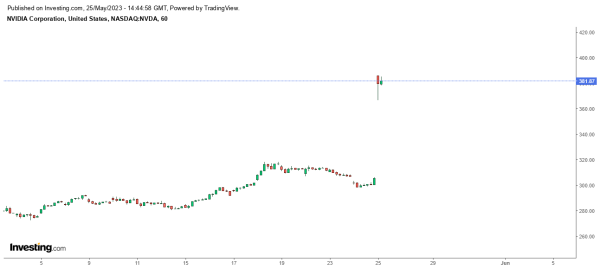The semiconductor industry is experiencing a significant surge in demand as digital transformation continues to reshape various sectors of the economy. TSMC (Taiwan Semiconductor Manufacturing Company) and ASML Holding N.V. (ASML), two pivotal players in the chip manufacturing ecosystem, have recently witnessed a remarkable rally following the release of NVIDIA’s earnings report.

This article will delve into the details of the market response and explore the implications of these developments for the global semiconductor industry.
NVIDIA's Strong Earnings Propel Chip Stocks
NVIDIA, the renowned American graphics processing unit (GPU) manufacturer, recently released its earnings report for the first quarter of 2023, exceeding market expectations. The company reported record-breaking revenues, driven primarily by its gaming and data center segments. NVIDIA’s impressive performance has sent ripples throughout the semiconductor industry, with chip stocks experiencing a significant boost in their market values.
TSMC's Soaring Stock Price
TSMC, the world’s largest dedicated semiconductor foundry, has emerged as one of the major beneficiaries of NVIDIA’s stellar earnings. As NVIDIA’s key manufacturing partner, TSMC stands to gain from the increased demand for advanced chips required by NVIDIA’s expanding product portfolio. TSMC’s stock price surged following the earnings report, reaching new heights and reinforcing its position as a cornerstone of the global semiconductor supply chain.
With its advanced fabrication processes and cutting-edge technology, TSMC has been a key enabler of innovation for numerous industries. The company’s ability to produce chips with smaller feature sizes and higher performance has made it a preferred choice for many technology giants. NVIDIA’s success further solidifies TSMC’s pivotal role in the semiconductor ecosystem.
ASML's Share Price Soars
ASML, a leading supplier of photolithography systems to chip manufacturers, has also experienced a significant rally in its share price following NVIDIA’s earnings report. ASML’s equipment is vital for TSMC’s chip production, as its lithography systems play a crucial role in creating intricate patterns on silicon wafers. The growing demand for TSMC’s advanced chips translates into increased orders for ASML’s cutting-edge photolithography machines, contributing to the rise in ASML’s stock value.
ASML has consistently pushed the boundaries of semiconductor lithography technology, enabling chip manufacturers to achieve higher levels of integration and performance. Its extreme ultraviolet (EUV) lithography systems have been instrumental in overcoming the challenges associated with shrinking feature sizes. With the industry’s growing reliance on ASML’s equipment, the company is poised to capitalize on the surge in demand for advanced chip manufacturing technology.
Find some amazing products of NVIDIA, you can purchase
Implications for the Semiconductor Industry
The rally in TSMC and ASML’s stock prices signifies the positive sentiment surrounding the semiconductor industry. As digital transformation accelerates across various sectors such as artificial intelligence, cloud computing, and autonomous vehicles, the demand for high-performance chips is set to soar. NVIDIA’s strong performance serves as a testament to the robust growth potential of the industry, driving optimism among investors and industry players alike.
The success of TSMC and ASML highlights the importance of collaboration and specialization within the semiconductor ecosystem. TSMC’s expertise in chip fabrication and ASML’s leadership in lithography technology exemplify the interconnected nature of the industry. The symbiotic relationship between these critical players underscores the need for continued innovation and investment in advanced chip manufacturing processes.
Overall , NVIDIA’s outstanding earnings report has propelled TSMC and ASML, two prominent companies in the semiconductor industry, to new heights. As NVIDIA’s key manufacturing partner, TSMC stands to benefit from the increased demand for advanced chips. Meanwhile, ASML’s photolithography systems play a crucial role in enabling TSM








